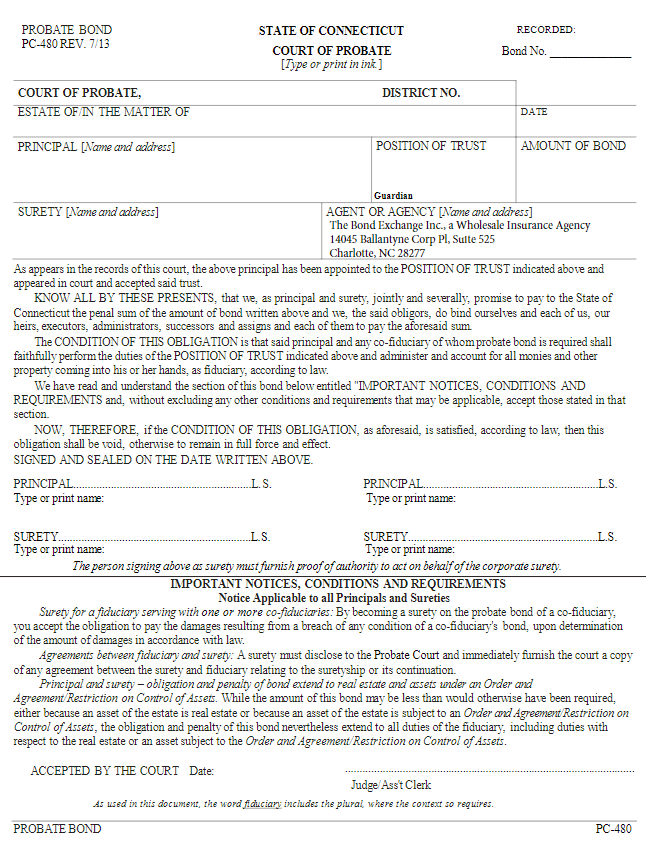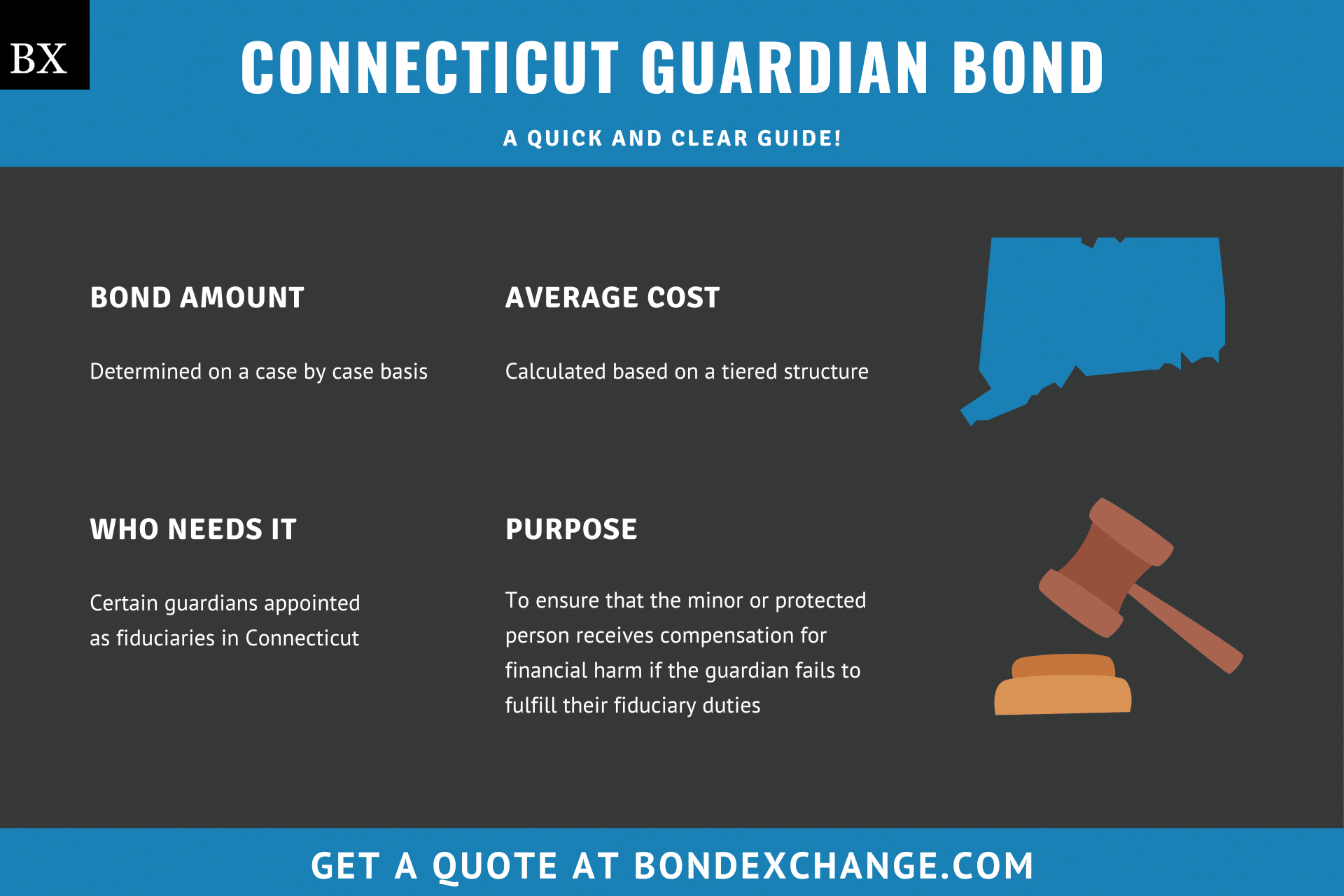Connecticut Guardian Bond: A Comprehensive Guide
This guide provides information for insurance agents to help their customers obtain a Connecticut Guardian bond. For information on the bonding requirements for Conservators in Connecticut, click here.
At a Glance:
- Average Cost: Calculated based on a tiered structure
- Bond Amount: Determined on a case-by-case basis (more on this later)
- Who Needs It: Certain guardians appointed as fiduciaries in Connecticut
- Purpose: To ensure that the minor or protected person receives compensation for financial harm if the guardian fails to fulfill their fiduciary duties
- Who Regulates Guardian Bonds in Connecticut: The probate court with jurisdiction over where the minor or protected person resides

Background
Connecticut Statute Chapter 802h requires all persons seeking guardianship over a minor or protected person to be appointed by a court before assuming their fiduciary duties. The Connecticut legislature enacted the appointment requirement to ensure that guardians act in the minor or protected person’s best interests when making decisions related to their health or managing their estate. To provide financial security for the enforcement of this requirement, certain guardians must purchase and maintain a probate surety bond before becoming appointed as a fiduciary.
What is the Purpose of the Connecticut Guardian Bond?
Connecticut requires certain guardians to purchase a surety bond as a prerequisite to being appointed as a fiduciary over the person and/or estate of a minor or protected person. The bond ensures that the minor or protected person will receive compensation for financial harm if the guardian fails to abide by the regulations outlined in Connecticut General Statute Chapter 802h and Connecticut Probate Court Rules of Procedure 35. Specifically, the bond protects the minor or protected person if the guardian fails to adhere to all court orders or mismanages the estate’s assets. In short, the bond is a type of insurance in favor of the minor or protected person if the guardian does not fulfill their fiduciary duties.
How Can an Insurance Agent Obtain a Connecticut Guardian Bond?
BondExchange makes obtaining a Connecticut Guardian bond easy. Simply log-in to your account and use our keyword search to find the “Guardian” bond in our database. Don’t have a login? Gain access now and let us help you satisfy your customers’ needs. Our friendly underwriting staff is available by phone (800) 438-1162, email or chat from 7:30 AM to 7:00 PM EST to assist you.
At BondExchange, our 40 years of experience, leading technology, and access to markets ensures that we have the knowledge and resources to provide your clients with fast and friendly service whether obtaining quotes or issuing bonds.
Not an agent? Then let us pair you with one!

Click the above image to find a BX Agent near you
How is the Bond Amount Determined?
Connecticut Probate Court Rules of Procedure 35.6 dictates that the bond amount must equal the value of the assets under the guardian’s control plus the additional income to be generated by the estate during the applicable accounting period.
The bond amount may be reduced by the value of any assets deposited into a restricted account or any real property that the guardian does not have the power to sell.
Can the Bond Amount be Adjusted?
Yes, as Connecticut Probate Court Rules of Procedures 35.8 and 35.9 dictate that the court may adjust the bond amount if there is a change in the value of the estate.
What are the Underwriting Requirements for the Connecticut Guardian Bond?
Most surety companies will examine the following factors when determining eligibility for the Connecticut Guardian bond:
- Guardian’s credit history
- Whether or not the estate has an attorney
- Whether or not the guardian is a family member
- The guardian’s occupation
- Whether or not the guardian is replacing a prior fiduciary
- If the guardian has ever committed a felony
- Whether or not there is any ongoing business in the estate
- If a creditor is requiring the bond
- If the bond amount is greater than or equal to the estate’s value
How Much Does the Connecticut Guardian Bond Cost?
Surety companies typically determine the premium rate for Guardian bonds based on a tiered structure, so larger bond amounts will be charged a lower premium rate than smaller bonds.
The following table illustrates the pricing structure for the Connecticut Guardian bond:
$1,500,000 Guardian Bond Cost
| Bond Amount | Premium Rate | Total Bond Cost |
|---|---|---|
| First $20,000 | 0.75% | $150 |
| Next $40,000 | 0.60% | $240 |
| Next $140,000 | 0.50% | $700 |
| Next $300,000 | 0.375% | $1,125 |
| Next $1,000,000 | 0.25% | $2,500 |
| Total cost of $4,715 |
Who is Required to Purchase the Bond?
Connecticut requires certain guardians to purchase a surety bond as a prerequisite to becoming a court-appointed fiduciary. To paraphrase Connecticut Statute Chapter 802h, a guardian is an individual appointed as a fiduciary over a minor or protected person’s health and well being and/or estate. Likewise, a “protected person” is defined as an adult for whom a guardian has been appointed that has an intellectual disability and is incapable of managing their personal care and/or financial affairs. Additionally, a minor is defined as a person under the age of eighteen for whom a guardian has been appointed.
There are different kinds of guardianships available in Connecticut and each one has its own specific circumstances for when a bond is required, as outlined below:
- Guardian of the Person of the Minor: A guardian authorized to take custody of and provide care for a minor, including making medical and personal decisions on their behalf. Guardians of the person of the minor are only required to obtain a bond if the court deems it necessary to protect the minor.
- Guardian of the Estate of the Minor: A guardian with legal control over the finances and business affairs of a minor. A guardian of the estate must be appointed if the minor’s assets are worth more than $10,000. Guardians of the estate of the minor are required to obtain a bond, however, the court may waive the requirement if the minor’s assets are less than $20,000 in value or if the assets are held in a restricted account.
- Guardian of a Protected Person: A guardian with supervision over certain or all aspects of the care of an adult with an intellectual disability. These guardians can petition the court for control of the adult’s finances if their assets and income do not exceed $10,000. If the petition is granted, the court may require them to obtain a bond if it is necessary to protect the adult’s estate. If their assets and income exceed $10,000 in value, the guardian may not manage the adult’s finances and a conservator of the estate may be needed.

How do Connecticut Guardians Become Appointed as Fiduciaries?
Guardians in Connecticut must navigate several steps to become appointed as fiduciaries. Below are the general guidelines for guardians, but appointees should refer to the appointment statutes or the state’s probate court website for details on the process.
Guardian of a Minor
Step 1 – Hire an Attorney
Although not explicitly required, it is highly recommended that guardians hire an attorney to assist with the appointment process.
Step 2 – File a Petition for Appointment
Persons seeking guardianship over a minor must file a petition for appointment with the probate court with jurisdiction over where the minor resides. Guardians should utilize the state’s Probate Court User Guide for instructions on filing the petition and the appointment process.
Step 3 – Attend a Hearing
Guardians must attend a hearing conducted by the probate court and present evidence as to why the minor is in need of guardianship. The court will examine the evidence presented by the guardian as well as that presented by the minor being evaluated (if any) and make a determination as to whether or not guardianship is necessary. If the court finds a basis for the appointment, it will issue a letter of guardianship to the petitioner.
Step 4 – Purchase a Surety Bond
Unless otherwise directed by the court, guardians of a minor must purchase and maintain a surety bond (limits outlined above).
Guardian of a Protected Person
Step 1 – Hire an Attorney
Although not explicitly required, it is highly recommended that guardians hire an attorney to assist with the appointment process.
Step 2 – File a Petition for Appointment
Persons seeking guardianship over a protected person’s estate must file a petition for appointment with the probate court with jurisdiction over where the protected person resides. Guardians should utilize the state’s Probate Court User Guide for instructions on filing the petition and the appointment process.
Step 3 – Notify the Appropriate Parties
After submitting the appropriate files to the court, persons seeking guardianship must have another adult, known as a server, notify the interested parties involved in the case. A state marshal or other authorized person can serve the notice of hearing to the protected person and the probate court will notify the petitioner and the protected person’s relatives.
Step 4 – Attend a Hearing
Guardians must attend a hearing conducted by the probate court and present evidence as to why the adult is in need of guardianship. The court will examine the evidence presented by the guardian as well as that presented by the adult being evaluated (if any) and make a determination as to whether or not guardianship is necessary. If the court finds a basis for the appointment, it will issue a letter of guardianship to the petitioner.
Step 5 – Purchase a Surety Bond
Unless otherwise directed by the court, guardians of a protected person must purchase and maintain a surety bond (limits outlined above).
How do Connecticut Guardians File Their Bonds?
Guardians should submit their completed bond forms, including the power of attorney, to the probate court with jurisdiction over where the minor or person resides.
The surety bond requires signatures from both the surety company that issues the bond, the applicant, and the judge presiding over the case. The surety company should include the following information on the bond form:
- Legal name and address of the entity/individual(s) buying the bond
- Surety company’s name and address
- Legal name of the guardian
- Location and district number of the probate court
- Bond amount
- Fiduciary title
- Date the bond is signed
What can Connecticut Guardians do to Avoid Claims Made Against Their Bonds?
To avoid claims against their bonds, guardians in Connecticut must ensure that they:
- Perform all of their fiduciary duties
- Obey all court orders
- Do not mismanage the estate’s assets
